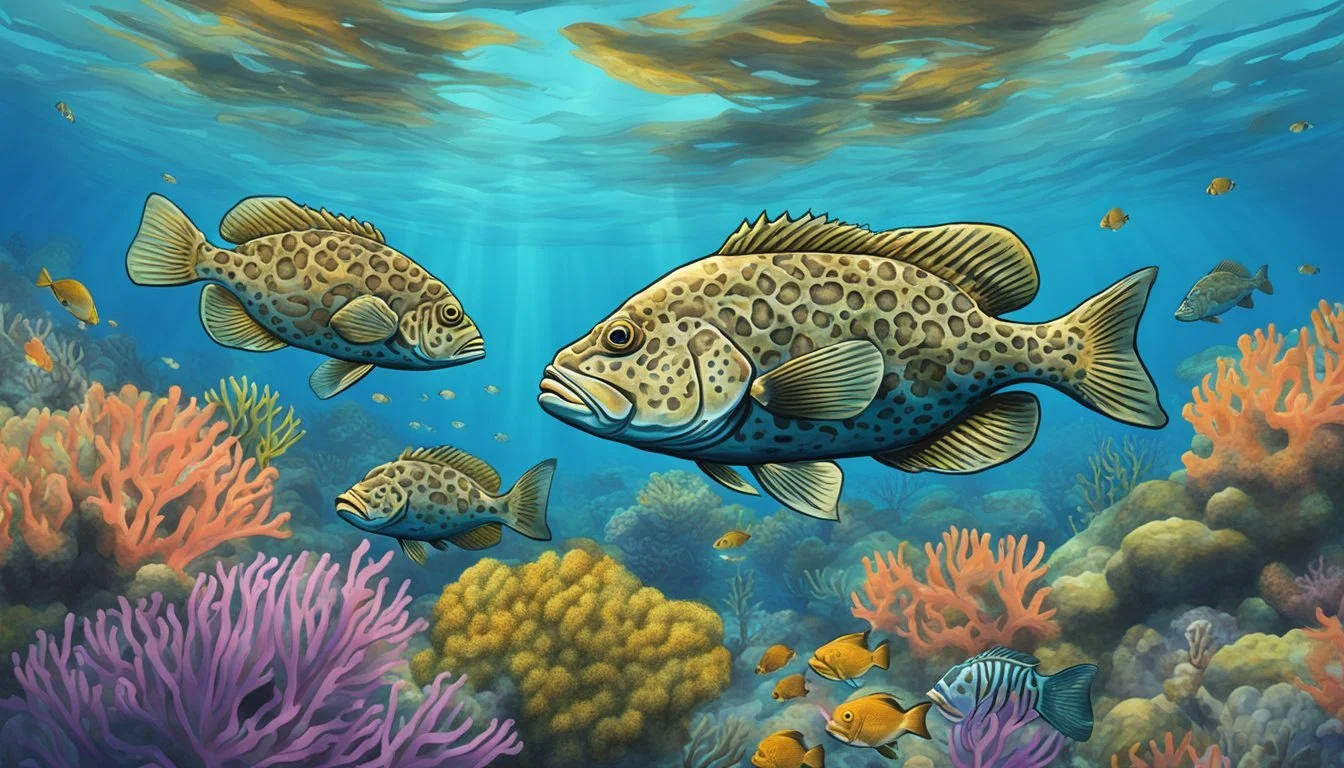Grouper Substitutes
Best Alternatives for Cooking
Finding a suitable replacement for grouper in your recipes can be essential when this prized fish is not readily available. Whether you choose red snapper, haddock, or cod, these options provide a mild and palatable flavor suitable for various dishes. Each alternative has its unique characteristics, but they all align closely enough with grouper to maintain the integrity of your meal.
Red snapper, widely available and versatile, works exceptionally well in most grouper recipes. Haddock offers a slightly firmer texture, making it an excellent choice for grilling and baking, while cod's mild flavor and flaky texture are perfect for dishes requiring a delicate touch. Halibut also presents a robust yet subtle flavor, ideal for a variety of cooking methods.
Pair these substitutes with citrus fruits, aromatic herbs, and spices such as black pepper, paprika, and garlic to enhance their natural flavors. This way, no matter which substitute you choose, your dish will remain flavorful and satisfying.
Understanding Grouper Characteristics
Grouper is known for its mild, sweet flavor and firm, flaky texture, making it a popular choice in many seafood dishes. Its white flesh is high in protein and rich in omega-3 fatty acids, which are crucial for a healthy diet.
Distinctive Texture and Flavor
Grouper's mild flavor pairs well with a wide variety of seasonings and ingredients, allowing chefs to create diverse dishes.
The flesh is firm yet flaky, providing a satisfying mouthfeel that holds up well in various cooking methods. Its white flesh and high protein content make it a nutritious option for health-conscious eaters. The fish's flavor profile is subtle, making it suitable for recipes that require gentle seasoning or bold flavors alike.
Grouper in Culinary Uses
Grouper is highly versatile and can be prepared in multiple ways, such as grilling, baking, frying, or steaming.
Its firm texture makes it a great candidate for grilling as it doesn't fall apart easily. It is often paired with citrus, herbs, and spices to enhance its natural taste. Additionally, the high levels of omega-3 fatty acids make grouper a heart-healthy choice for seafood lovers. Whether served in a simple lemon butter sauce or included in a complex seafood stew, grouper adapts well to numerous culinary techniques.
Prime Grouper Substitutes
Grouper is known for its mild flavor and firm texture, making it a popular choice for various culinary preparations. There are several fish alternatives that mimic these qualities, each with unique characteristics suitable for different dishes.
Best Fish Alternatives
Mahi-Mahi is a top substitute because of its firm texture and slightly sweet flavor. It works well in grilling, baking, and frying, capturing the essence of grouper's taste profile.
Halibut offers a mild, sweet flavor and firm texture, making it a versatile option for many recipes. It is often used in similar dishes where grouper shines, such as meaty stews or pan-seared preparations.
Catfish provides an affordable option, readily available in most grocery stores. This fish has a mild flavor and firm flesh, making it a decent stand-in for grouper in various recipes.
Selecting Based on Texture and Flavor
For a firm and slightly sweet flavor profile, Black Sea Bass is a prime choice. Its firm texture holds up well in grilling, baking, and frying, similar to grouper.
Red Snapper also offers a firm texture and mild flavor, making it another excellent substitute. Its cooking times are similar to grouper, making it a convenient swap in most recipes.
Considering Tilapia for milder flavor preferences can be effective. While its texture is less firm than grouper, it's versatile in its preparation methods, whether baked, grilled, or fried.
Using Cod provides a delicate, flaky texture that differs from the firm flesh of grouper but offers a mild flavor that works well in broths or light sauces.
Haddock can be a substitute for those who need a firmer texture with a slightly sweeter taste, suitable for various cooking methods like frying or baking.
Health and Nutrition
Grouper substitutes offer a variety of health benefits due to their nutrient content. They are rich in omega-3 fatty acids and lean protein, making them great for a healthy diet. Additionally, these fish are low in calories and contain essential vitamins and minerals.
Benefits of Omega-3 and Lean Protein
Many grouper substitutes, like trout, Alaskan halibut, and cod, are excellent sources of omega-3 fatty acids. Omega-3s are essential for heart health, reducing inflammation, and improving brain function. These substitutes provide lean protein, which is crucial for muscle repair and growth. Consuming lean protein sources helps maintain a healthy weight and supports overall bodily functions. Fish such as branzino and striped bass also contain significant amounts of omega-3s and contribute to cardiovascular health.
Calorie Intake and Nutrient Content
Substitutes for grouper, including mahimahi and red snapper, are low in calories yet rich in essential nutrients. These fish provide significant amounts of vitamins and minerals, such as vitamin D, selenium, and various B vitamins. Vitamin D is vital for bone health, while selenium plays a crucial role in protecting cells from damage. The low-calorie content of these fish makes them suitable for weight management. Additionally, their nutrient-dense profiles help meet daily dietary requirements efficiently.
Preparing Your Fish
Ensuring your fish is correctly prepared is crucial to achieving the best flavor and texture. Each cooking method offers unique benefits, and seasoning can greatly enhance your dish.
Cooking Techniques and Tips
Baking: Preheat the oven to 375°F (190°C). Place the fish on a baking sheet, lightly oil, and bake for 12-15 minutes, depending on thickness.
Grilling: Preheat to medium-high. Oil the grill grates and place the fish skin-side down. Cook for 3-6 minutes per side.
Frying: Heat oil in a pan over medium heat. Fry the fish for 4-5 minutes on each side until golden brown.
Poaching: In a shallow pot, simmer water with aromatics. Submerge the fish and cook for 10-15 minutes.
Steaming: Place the fish in a steamer basket over boiling water. Steam for around 10-12 minutes.
Broiling: Set the oven to broil. Place the fish 4-6 inches from the heat source and broil for about 5-7 minutes.
Seasoning Pairings
Lemon and Herbs: Lemon wedges and fresh herbs like dill or parsley complement the fish's natural flavor.
Garlic and Butter: Minced garlic sautéed in melted butter provides a rich, savory touch.
Asian-Inspired: Soy sauce, ginger, and sesame oil give a distinct flavor profile.
Cajun Seasoning: A blend of paprika, cayenne, and thyme offers a spicy kick.
Citrus and Spice: Combining lime or orange zest with chili flakes creates a vibrant taste.
Classic Salt and Pepper: Simple but effective, always enhances the fish without overpowering it.
Incorporating Substitutes in Recipes
Choosing the right substitute for grouper can ensure that your dish remains delicious and flavorful. This section will focus on how to adapt the flavor profile and maintain the integrity of your dish.
Adapting the Flavor Profile
When substituting grouper, it's important to choose fish that share a similar flavor. Halibut, with its mild, sweet flavor, is a common choice. Mahi-mahi provides a firm texture reminiscent of grouper. Red snapper and striped bass are also good alternatives due to their similar taste profiles.
Use seasonings like garlic, black pepper, and paprika to enhance the flavor of substitutes. Aromatic herbs such as parsley, cilantro, and basil also pair well. Combining these with citrus fruits like lemon and lime can elevate the dish, providing a bright, fresh taste.
Maintaining Dish Integrity
The key to maintaining dish integrity lies in the cooking method. Substitutes like cod and red snapper hold up well in grilling, baking, and frying. Ensure fish thickness matches grouper to achieve similar cooking times. For instance, grill mahi-mahi for about 3-4 minutes per side, comparable to grouper.
For recipes like fishcakes, ensure the substitute fish is firm and flaky. Adapting cooking times—red snapper grilled for 5 minutes per side, or branzino grilled whole for 7 minutes per side—maintains texture and flavor. When used in salads or alongside rice and vegetables, these substitutes should keep the dish both cohesive and flavorful.
Availability and Sustainability
Grouper is not only popular for its taste but also significant for its sustainable sourcing. Ensuring responsible consumption and understanding local availability are critical.
Choosing Sustainable Seafood
Sustainability in seafood is essential to prevent overfishing and maintain ecosystem balance.
When selecting replacements for grouper, it is vital to choose species that are responsibly harvested. For instance, the Gulf of Mexico offers several sustainable options. Mahimahi, Red Snapper, and Striped Bass are often recommended, as they share similar textures and flavors with grouper. These species are not only resilient but also managed under strict regulations to prevent overharvesting.
Consumers are advised to look for certifications such as the Marine Stewardship Council (MSC) or the Aquaculture Stewardship Council (ASC). These labels indicate that the seafood has been sourced responsibly. Additionally, app guides such as the Seafood Watch app can provide real-time information on sustainable choices.
Considering Local and Seasonal Availability
Local and seasonal availability of seafood greatly affects choices for cooking. For instance, grouper is predominantly found in saltwater habitats around the Mid-Atlantic States, Gulf of Mexico, and parts of South America and Central America.
It's essential to opt for locally harvested fish as replacements. Mahimahi and Alaskan Halibut are excellent alternatives, commonly available and often caught within sustainable limits. Moreover, Trout is also a viable substitute, particularly when seeking a health-conscious option.
Checking local fish markets and seasonal charts ensures that the seafood is fresh and supports local fisheries. This practice not only aligns with sustainability but also enhances the community’s economy by promoting regional catches. With mindful choices, consumers can enjoy their seafood dishes responsibly.
Grouper Facts and Ecology
Grouper fish are diverse and play significant roles in their ecosystems. They thrive in varied marine habitats and contribute to the balance of their environments through their predatory behavior.
Species Variety and Habitats
Grouper encompass over 100 varieties and are primarily found in warm tropical and subtropical waters. They are widely distributed across the Atlantic, Pacific, and Indian Oceans.
Certain species, like the red grouper, are common in the waters off Florida.
Grouper are known for their ability to inhabit a range of marine environments. These include rocky reefs, shallow coastal waters, and in some cases, deep seawater habitats.
Their adaptability allows them to thrive in various temperatures, though they prefer warmer seas.
Grouper's Role in Marine Ecosystems
Grouper fish play essential roles in maintaining the balance of marine ecosystems.
As predators, they help control the populations of other fish and invertebrates, preventing any single species from becoming too dominant.
They often target smaller fish species, including those occupying lower trophic levels.
This control helps preserve diverse marine life and supports healthier coral reefs.
Their presence benefits commercial fisheries by maintaining the fish stocks.
Moreover, groupers are indicators of ecosystem health, with thriving grouper populations pointing to robust and balanced marine environments.









